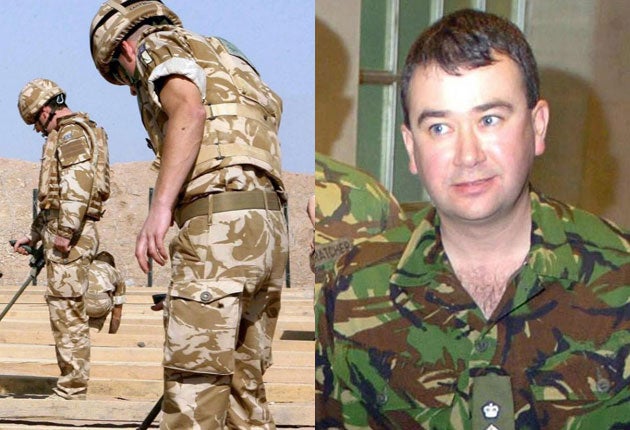Army decides to detonate rather than dismantle Taliban bombs
Dramatic increase in IEDs and shortage of specialists leads to change in tactics

In an attempt to take the pressure off bomb disposal officers in Afghanistan, combat engineers will now be tasked with blowing up many of the improvised devices rather than having to dismantle every one of them.
The revelation came as the most senior bomb disposal officer in the country, Colonel Bob Seddon, resigned after suggesting he needed more operatives on the ground and was concerned about the pressures being placed on his men in Afghanistan, as well as the "psychological price" they may pay, long term.
The move represents a shift in policy to try to alleviate the pressure on operatives from 11 EOD (Explosive Ordnance Disposal Regiment), four of whom have been killed in just over a year in Helmand.
Traditionally, 11 EOD's ammunition technicians (ATOs) have been tasked with making the "long walk" alone to dismantle unexploded improvised explosive devices (IEDs) in order to gather forensics and intelligence on the enemy. But the number of IEDs in Helmand, now responsible for most British deaths, has escalated dramatically, meaning that the operatives are worked to the point of exhaustion trying to deal with the sheer volume of bombs.
Colonel Seddon, the principal ammunition technician in the Royal Logistics Corps, told BBC1's Panorama programme last night that he was very concerned at the pressures faced by his men in Afghanistan.
He continued: "I'm very concerned that in the longer term some of my people who have done phenomenally difficult and dangerous work in Afghanistan may pay a deeper psychological price for the work that they've conducted."
Christina Schmid, whose husband, Staff Sergeant Olaf "Oz" Schmid, was killed in October last year while trying to dismantle an IED, insisted that she believed the stress and exhaustion of working such long hours may have played a part in his death.
While sources insisted that Colonel Seddon's resignation on 26 April had to do with a variety of factors including the restructuring of his role, his concerns were understood to be a "contributing factor".
The key problem facing the Ministry of Defence is that it takes up to seven years to train a highly specialised ATO. The fact that the MoD suspended bomb squad recruitment in 2002 for 18 months has resulted in a severe shortage of operatives to deal with the huge numbers of IEDs in Iraq and Afghanistan.
"The army is trying to get their best people out there but we still have this gaping hole that was created by negligence on the part of some of the senior people and politicians back in 2002," said Major Chris Hunter, a former high threat operative with 11 EOD.
As a consequence the MoD has put in place a series of measures including offering a £26,000 bonus after tax to those willing to stay on for four years or rejoin the service, although it is unlikely to prove a great incentive to men who do the job because of an intense sense of duty and who often only leave because of the pressures on their families. The MoD has also opened up the high threat course to members of other services.
But with an immediate solution required, it has now tasked Royal Engineers, who traditionally work with 11 EOD operatives in search teams, to explode some of the devices at a distance rather than having to dismantle each one. This will mean that soldiers with less training will be able to neutralise the devices, lessening the pressure on the ATOs. Sources said it was a temporary measure until more ATOs could be trained.
The move is likely to be greeted with some controversy, said Major Hunter, who added: "Only the most experienced operative will know whether a device can be exploded or needs to be dealt with in place."
Major General Chris Deverell, director general of Logistics, Support & Equipment, said: "Countering this dynamic threat is one of our highest priorities; advanced EOD operators play a key role in this battle."
Join our commenting forum
Join thought-provoking conversations, follow other Independent readers and see their replies
Comments